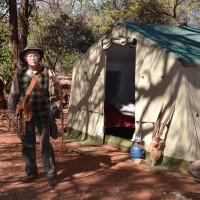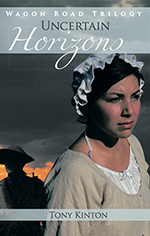Africa Revisited
Limpopo Province, South Africa. Bushveld. Land of the acacia and baobab and wait-a-bit thorns. A place time has neglected, where bird call serves as alarm clock, where the human intruder can lie awake nights as baboons scold from their koppie and treetop dwellings at a leopard beneath. A place where that same human can brush the Milky Way with feeble fingertips while a campfire performs its perfect ballet, can see the Southern Cross vividly suspended in lucid skies.
The province derives its name from that river bearing the same: Limpopo. It forms a boundary between Botswana and South Africa. Zimbabwe and Mozambique are not far to the north – at least not far in African terms. It was here, in this land of protracted and monstrously perplexing mystery, I concluded years back that experiences are the finest form of wealth. I was now again inextricably bound by its intoxicating marvels.
We first spotted the nyala bull from our truck while changing locations on the concession. Red dust boiled from a ragged ranch road as we stopped to allow my PH, Louis Steenkamp, an opportunity for closer scrutiny through his binocular. Petrus, the tracker, sat quietly as Louis whispered instructions in Afrikaans to his brother Marinus at the wheel. I determined from the animated gestures that a viable chance for stalking was available.
“Do you want to try for this one?” Louis quizzed me in that fluid and beautiful South African accent. My response demanded no words, for evidence in the affirmative was given by a hasty gathering of quiver and bow. Simultaneously, three of us stepped from the truck and onto African soil. I fell in line behind Louis and Petrus. What at that moment could possibly become a quick end to the hunt eventually morphed into a series of events that were filled with discouragement and elation.
The evening before, several of us sat around a fire and talked hunting. Nyala became the centerpiece of that conversation, and Martinus coaxed us toward wonderment with his review of a Zulu legend regarding this grand animal.
According to that legend, all the spiral horns became involved in an argument, this focused on which among the various species was the most beautiful. Each would opine in expected fashion: “We are,” so said the eland. “No, it is the kudu,” a member of that fraternity added. “Impossible,” noted the bongo. “We are the most striking of them all.” And so it went. With no solution reached, the animals petitioned God to come down and settle the matter.
God obliged, and arranged all the spiral horns into a side-by-side line, along which He walked back and forth, admiring each individual. It is said that God finally stopped in front of the nyala, nestled the bull’s face and head gently in His hands and proclaimed, “You are the most beautiful.” The place just below the eyes where God’s thumbs rested became that glorious white chevron. And where His fingertips touched along the jaw lines became those white spots. I could offer no credible argument with this tale, for only God could create such a grand and handsome creature as the nyala.
And on the afternoon prior to this fireside enlightenment, serendipity took place on another concession. We were on an errand to retrieve a huge warthog taken an hour earlier, when an aging tracker stopped and motioned to the ground. The spoor to which he referred was all but invisible, that is until he pointed it out. Louis interpreted. It was leopard dung that revealed the cat had been feeding on kudu. Evidence was ample, this supported by multiple pictures of two outsized leopards on game cameras.
That evening, after the discovery of leopard spoor and the sharing of marvelous tales from the African bush, I went to the tent and drifted off to sleep with hopes of hearing guttural grunts of this most intriguing of all felines. Being separated from a leopard by only a canvas wall is the stuff of dreams.
We made profitable progress in our stalk toward the nyala. The wind was right and heavy brush afforded ample concealment. Slowly and deliberately, we continued. I nocked an arrow. But then, with no provocation other than his own whims, the bull moved – maybe 100 yards and to another acacia cluster, where he busied himself with more leaf munching. The process had to stop so that a new stalk could be planned.
And so it was. This one, however, ended as the one before it. Two more times it happened. The sun was now beginning to cast haunting shadows and a chill had returned to the African air. Day four was coming to a close. This nyala could be slipping away, as were the remaining hours of the hunt. But then a sudden change. With Petrus holding back in the brush, Louis and I found ourselves within 20 yards of the preoccupied bull. It was time for a shot.
Most hunters recognize fully a new arrival that shows up about this same time within the completion of a chosen goal. It is a sentiment apart from target panic or buck fever or whatever you opt to label it; it is something more. It is not the question of whether or not the shooter can make the shot. I was confident of that fact. The question is and was: “Do I want to do this?” Such a moment seems ill placed after so much practice and expense and travel and distance, but there it was. That ache, that uncertainty. Time comes to a halt and the hunter, at least this is true for me, finds himself or herself in a bubble of anticipatory grief, its rough edges not yet sanded smooth by exhilaration.
But that hunter must choose; in this case I must choose. I could draw and release the arrow or I could simply smile and walk away. There would be rewards in either selection. I do not recall when the decision became firm, but I do recall the sight picture and the anchor and the realization that I was about to deliver meat to those who needed it badly and I would in the future be afforded the distinct pleasure of looking at the fingerprints of God on my wall. No recall of the release, but the arrow, without notice, smacked solidly into that pocket just at the upper knuckle of the front leg, behind which lay the heart. There would be no need for a tracker.
As I approached the bull and made certain that the end had come with haste and certainty, Louis and Petrus waited from some distance back. They gave me the freedom to experience this entire episode in any manner I elected. For they, too, are hunters; they have felt the sobering sadness mixed to perfection with elation. There would be no high fives or senseless jubilation, though there was quiet satisfaction more than evident. I removed my hat and knelt in a long prayer of thanksgiving. Once again God had blessed me, Africa had embraced me and all was well with the world.


 Tony Kinton is a native Mississippian, where he grew up on a small farm. Hunting and fishing were regular parts of his life, and these pursuits produced much of the food found on his family’s table.
Tony Kinton is a native Mississippian, where he grew up on a small farm. Hunting and fishing were regular parts of his life, and these pursuits produced much of the food found on his family’s table. 



